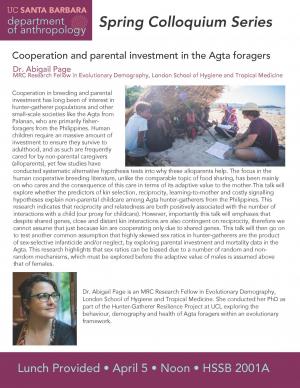Event Date:
Friday, April 5, 2019 - 12:00pm
Event Location:
- HSSB 2001A
Talk by Dr. Abigail Page, MRC Research Fellow in Evolutionary Demography, London School of Hygiene and Tropical Medicine
Cooperation in breeding and parental investment has long been of interest in hunter-gatherer populations and other small-scale societies like the Agta from Palanan, who are primarily fisher-foragers from the Philippines. Human children require an massive amount of investment to ensure they survive to adulthood, and as such are frequently cared for by non-parental caregivers (alloparents), yet few studies have conducted systematic alternative hypothesis tests into why these alloparents help. The focus in the human cooperative breeding literature, unlike the comparable topic of food sharing, has been mainly on who cares and the consequence of this care in terms of its adaptive value to the mother.This talk will explore whether the predictors of kin selection, reciprocity, learning-to-mother and costly signalling hypotheses explain non-parental childcare among Agta hunter-gatherers from the Philippines. This research indicates that reciprocity and relatedness are both positively associated with the number of interactions with a child (our proxy for childcare). However, importantly this talk will emphases that despite shared genes, close and distant kin interactions are also contingent on reciprocity, therefore we cannot assume that just because kin are cooperating only due to shared genes. This talk will then go on to test another common assumption that highly skewed sex ratios in hunter-gatherers are the product of sex-selective infanticide and/or neglect, by exploring parental investment and mortality data in the Agta. This research highlights that sex ratios can be biased due to a number of random and non-random mechanisms, which must be explored before the adaptive value of males is assumed above that of females.
March 27, 2019 - 4:38pm




